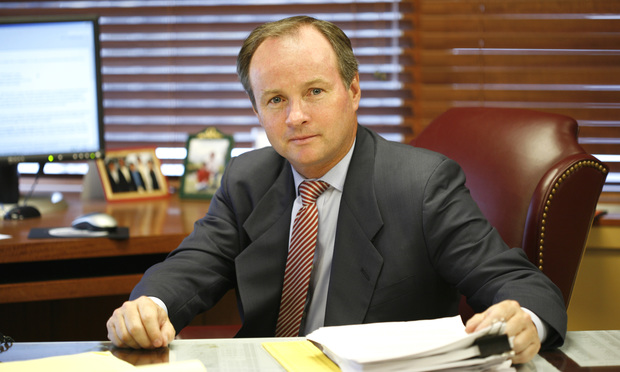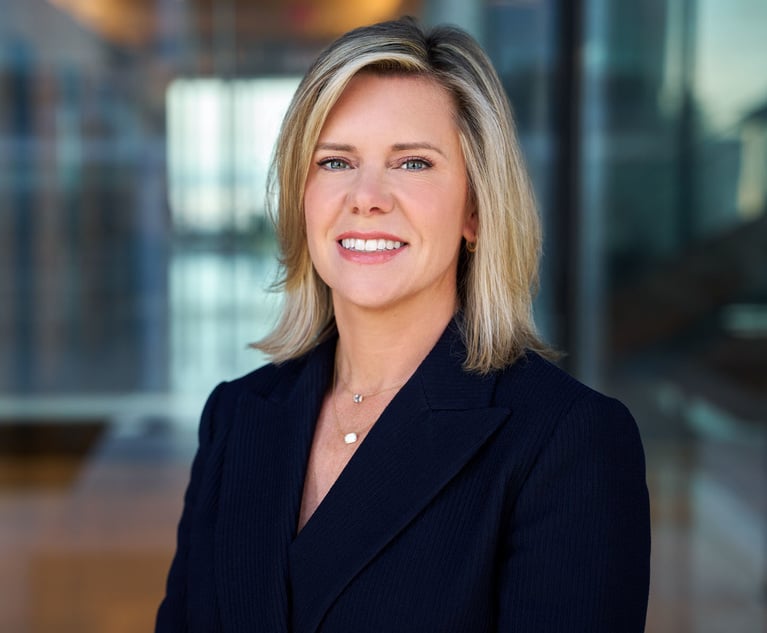Cahill Bounces Back on Leveraged Finance Strength After Financial Year 'Anomaly'
A resurgence in leveraged finance work, plus the lawyers' "blood, sweat and collections," helped push Cahill's profits per partner past $3.8 million last year, said the firm's chairman.
March 11, 2020 at 04:29 PM
4 minute read
 William Hartnett, chairman of Cahill Gordon & Reindel. Courtesy photo
William Hartnett, chairman of Cahill Gordon & Reindel. Courtesy photo
Boosted by strong performance in its leveraged finance and general corporate practices, Cahill Gordon & Reindel's revenue and profits rebounded last year, recovering from the firm's 7% decline in 2018.
Cahill's gross revenue rose in 2019 rose by 7.6% to $387.8 million, similar to 2017 levels, while the firm pushed up its average profits per equity partner by almost 12%, to nearly $3.84 million, surpassing 2017 numbers.
Cahill chairman William Hartnett said the firm's reputation as the "gold standard" for lender-side representations on high-yield bond work paid off in 2019, growing net income to $243.8 million, up 14.6%. The firm grew its bottom line, even with a net increase of two equity partners.
"I viewed '18 as an anomaly in the high-yield market, and I expected that to bounce back, and it did," Hartnett said.
Hartnett pegged the firm's billing rate increases around a modest 2% and said there were no aberrations, such as a high volume of receivables coming into 2019, that skewed the firm's financial performance. The results were driven by "blood, sweat and collections," he said.
Revenue per lawyer grew 9.6% at Cahill last year, from $1.24 million to $1.36 million. While the equity partnership grew slightly, overall head count dropped about 2.1%, meaning that even as profitability grew—the firm's margin rose from 59% to 63%—leverage dropped. Hartnett said Cahill managed to "control" expenses, too, although he said it was more "nickels and dimes" than in any major category, such as rent.
He said Cahill's biggest investments have been in its lawyers. "We have 30 partners who are fluent in leveraged finance [and] we have great associates coming up through the ranks. The only investment you can make to maintain the position we have maintained through 40 years is through the quality of your lawyers," he said.
"One thing we are not is complacent," he said. "We don't believe we have a monopoly on talent and marketing skills."
The firm's work on high-yield bonds, high-interest loans and other leveraged transactions is a key driver of business, accounting for 60% to 70% of all its corporate work, Hartnett said. Cahill lawyers worked on more than $84 billion of bond deals and nearly $200 billion in leveraged loans in 2019, compared with $50 billion and $245 billion, respectively, in 2018, according to statistics from Refinitiv Loan Connector.
That wasn't the only growth area, however. Hartnett said the firm had a "very strong year" in middle-market mergers and acquisitions, representing strategic buyers and sellers in certain transactions and lenders in other leveraged deals. He said partner Kimberly Petillo-Décossard has been recognized for her work in the field.
The firm's litigation department, led by Herb Washer, had good results but also helped fill the business pipeline for 2020, Hartnett said. He praised its work for Credit Suisse: in September, one judge threw out a class action against the investment bank over exchange-traded notes that suing investors had claimed were too risky, while in a case over foreign exchange rate-rigging, the bank partly defeated a class certification effort. That same month, two other civil suits accusing the bank of anti-competitive behavior were tossed.
The firm's first two months of 2020, particularly in corporate work, have been very busy, Hartnett added. While the novel coronavirus could hurt the economy, he sounded a tone of cautious optimism.
"I'm looking for double-digit bottom-line growth for 2020," he said.
The 2019 financial figures reported in this report are preliminary. ALM will report finalized data for the Am Law 200 in The American Lawyer's May and June issues.
This content has been archived. It is available through our partners, LexisNexis® and Bloomberg Law.
To view this content, please continue to their sites.
Not a Lexis Subscriber?
Subscribe Now
Not a Bloomberg Law Subscriber?
Subscribe Now
NOT FOR REPRINT
© 2025 ALM Global, LLC, All Rights Reserved. Request academic re-use from www.copyright.com. All other uses, submit a request to [email protected]. For more information visit Asset & Logo Licensing.
You Might Like
View All
Orrick Hires Longtime Weil Partner as New Head of Antitrust Litigation

Profits Surge Across Big Law Tiers, but Am Law 50 Segmentation Accelerates
4 minute readLaw Firms Mentioned
Trending Stories
- 1Trump's DOJ Files Lawsuit Seeking to Block $14B Tech Merger
- 2'No Retributive Actions,' Kash Patel Pledges if Confirmed to FBI
- 3Justice Department Sues to Block $14 Billion Juniper Buyout by Hewlett Packard Enterprise
- 4A Texas Lawyer Just Rose to the Trump Administration
- 5Hogan Lovells Hires White & Case Corporate and Finance Team in Italy
Who Got The Work
J. Brugh Lower of Gibbons has entered an appearance for industrial equipment supplier Devco Corporation in a pending trademark infringement lawsuit. The suit, accusing the defendant of selling knock-off Graco products, was filed Dec. 18 in New Jersey District Court by Rivkin Radler on behalf of Graco Inc. and Graco Minnesota. The case, assigned to U.S. District Judge Zahid N. Quraishi, is 3:24-cv-11294, Graco Inc. et al v. Devco Corporation.
Who Got The Work
Rebecca Maller-Stein and Kent A. Yalowitz of Arnold & Porter Kaye Scholer have entered their appearances for Hanaco Venture Capital and its executives, Lior Prosor and David Frankel, in a pending securities lawsuit. The action, filed on Dec. 24 in New York Southern District Court by Zell, Aron & Co. on behalf of Goldeneye Advisors, accuses the defendants of negligently and fraudulently managing the plaintiff's $1 million investment. The case, assigned to U.S. District Judge Vernon S. Broderick, is 1:24-cv-09918, Goldeneye Advisors, LLC v. Hanaco Venture Capital, Ltd. et al.
Who Got The Work
Attorneys from A&O Shearman has stepped in as defense counsel for Toronto-Dominion Bank and other defendants in a pending securities class action. The suit, filed Dec. 11 in New York Southern District Court by Bleichmar Fonti & Auld, accuses the defendants of concealing the bank's 'pervasive' deficiencies in regards to its compliance with the Bank Secrecy Act and the quality of its anti-money laundering controls. The case, assigned to U.S. District Judge Arun Subramanian, is 1:24-cv-09445, Gonzalez v. The Toronto-Dominion Bank et al.
Who Got The Work
Crown Castle International, a Pennsylvania company providing shared communications infrastructure, has turned to Luke D. Wolf of Gordon Rees Scully Mansukhani to fend off a pending breach-of-contract lawsuit. The court action, filed Nov. 25 in Michigan Eastern District Court by Hooper Hathaway PC on behalf of The Town Residences LLC, accuses Crown Castle of failing to transfer approximately $30,000 in utility payments from T-Mobile in breach of a roof-top lease and assignment agreement. The case, assigned to U.S. District Judge Susan K. Declercq, is 2:24-cv-13131, The Town Residences LLC v. T-Mobile US, Inc. et al.
Who Got The Work
Wilfred P. Coronato and Daniel M. Schwartz of McCarter & English have stepped in as defense counsel to Electrolux Home Products Inc. in a pending product liability lawsuit. The court action, filed Nov. 26 in New York Eastern District Court by Poulos Lopiccolo PC and Nagel Rice LLP on behalf of David Stern, alleges that the defendant's refrigerators’ drawers and shelving repeatedly break and fall apart within months after purchase. The case, assigned to U.S. District Judge Joan M. Azrack, is 2:24-cv-08204, Stern v. Electrolux Home Products, Inc.
Featured Firms
Law Offices of Gary Martin Hays & Associates, P.C.
(470) 294-1674
Law Offices of Mark E. Salomone
(857) 444-6468
Smith & Hassler
(713) 739-1250








